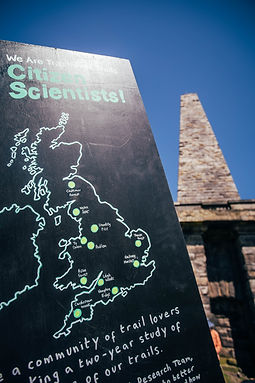What is Citizen Science?
Before we get into the research, check in with yourself; would you count yourself as a scientist? There might be a few among you who work as scientists in their day to day life, but the majority of volunteers in our community haven’t done any ‘science’ since potentially dissecting a frog at school!
Science isn’t often seen as a hobby, and so very few of us think of ourselves as scientists, able to contribute to making discoveries and developing research.
Citizen Science, however, challenges that idea of what science is, and ‘who’ can be a scientist. Instead of lab coats and PhDs, it’s all driven by volunteers from all walks of life. It’s individuals and groups like yourselves who care about our natural world, donating time and data to a bigger project.

What does this look like ?
There are lots of different kinds of Citizen Science. In some cases, professional
scientists might collaborate with a group of volunteers to develop a project.
For us at Trash Free Trails, we’re training our volunteers to become Citizen
Scientists so they have the tools and knowledge to collect data on single-use
pollution in a scientifically accurate way from wherever you adventure.
This helps us develop the biggest and most detailed picture of single-use
pollution and the impact it's having.
We have three types of data our Citizen Scientists capture:
Each of these has been developed with professional scientists, and is built on scientific methods so we can work as effectively as possible. According to our data, up to 9.2 million pieces of single-use pollution are on UK public rights of way. By sharing data about the trash on your trails you’re not only removing single-use pollution, but taking scientifically robust action to protect the places you love for the future.

What's Next?
Other than access to a local wild place, you'll need a phone with internet access to complete the research. To get started, simply head to the next session!
Special thanks to Plas y Brenin National Outdoor Centre Wales for providing the unparalleled backdrop and support with filming this Toolkit.This toolkit is made possible by our Programme Partners:



